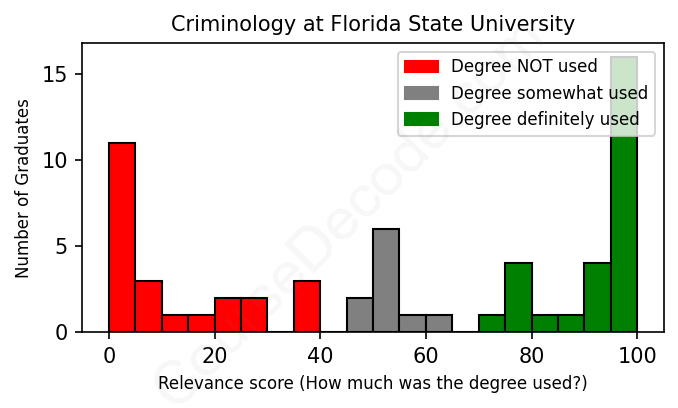
First, some facts. Of the Criminology graduates from Florida State University we've analyzed , here's how many have used (or NOT used) their degree in their career:

These are estimates based on AI analysis of 60 LinkedIn profiles (see below).
The verdict? Significantly below average. Overall, with an average relevance score of 54%, Criminology graduates from Florida State University have a much lower likelihood (-13%) of finding work in this field compared to the average graduate across all fields:
And for comparison, here's the chart for all profiles we've looked at across all degrees.
Also, after graduating, only 30% of these graduates have pursued further education other than another Bachelor's degree (such as a Masters degree or other), compared to the average across all profiles of 35%. This suggests a Bachelors degree is enough for most Criminology graduates, and it's normal to look for work straight after graduation.
See the details:
|
Relevance score: 50% We think this person has gone into a career only somewhat relevant to their degree. We think this person has gone into a career only somewhat relevant to their degree.
DEGREE INFOGraduated in 2018 from Florida State University with a Bachelor of Science (BS) in Criminology. No other secondary education since. JOB HISTORY SINCE GRADUATIONAdministrative Assistant Florida Department of Juvenile Justice Jan 2019 - Present ABOUTNo information provided. |
The top 10 most common jobs done by the graduates we've analyzed (ranked most common to least) are:
When analyzing the career paths of individuals who graduated with a degree in Criminology from Florida State University, a clear trend emerges. Many alumni have taken roles that are either directly or tangentially related to the fields of criminal justice and law enforcement, while others have veered into completely unrelated professions. The most common types of jobs include positions in law enforcement, legal services, financial crime investigation, compliance, and even social work.
For those who entered the criminal justice sphere, positions such as police officer, probation officer, and various roles within the Florida Department of Corrections were prevalent. These positions typically require a solid grasp of criminological theories and practices, making them directly relevant to their degree. On the other hand, several graduates found employment in finance, particularly in anti-money laundering and compliance roles. While these jobs do leverage skills related to criminology, such as understanding criminal behavior and the motivations behind financial crime, they often do not encompass the broader spectrum of criminological study that involves policing or rehabilitation practices.
Interestingly, there is a substantial number of graduates who pursued careers that are not aligned with criminology at all. Positions like bakery manager, sales associate, and marketing specialist, while contributing to career experience and skills development, do not utilize criminology-specific knowledge. This highlights a significant gap, where not all graduates manage to translate their degree into a directly related career path. In summary, while there are notable instances of relevance and application of criminological knowledge, a considerable portion of the alumni population takes paths that diverge significantly from what one might expect for a criminology graduate.
Here is a visual representation of the most common words in job titles for Criminology graduates (this is across all Criminology graduates we've analyzed, not just those who went to Florida State University):

When you look at the career trajectories of graduates with a Criminology degree from Florida State University, it’s clear that there’s a broad spectrum of paths taken, especially right after graduation and as time goes on. Many graduates tend to start their careers in roles related to criminal justice, law enforcement, or compliance. For instance, some took on positions like Loss Prevention, Agency Internships in the Department of Corrections, or even law clerk roles shortly after graduation. This indicates that many graduates are at least initially aiming for jobs that are relevant to their field of study, which is a good sign.
However, as we look five or ten years down the road, things get a bit more mixed. While some folks climb the career ladder within criminology-related fields like compliance, risk management, or even law, others start to drift away from their original focus. For example, some graduates end up in roles that don’t really connect to criminology, such as sales, customer service, or teaching. This suggests that while many start strong in their field, life’s circumstances or personal choices may lead them to explore other career opportunities that don’t directly utilize their criminology education.
It’s worth noting that graduates who stick with law enforcement tend to continuously advance. Several graduates remain in jobs like probation officers or investigators and work their way up to senior roles. Conversely, those who veer off the criminology track often find success but in entirely different areas, proving that a Criminology degree can provide a versatile foundation. Overall, while a lot of Florida State's criminology grads start on paths related to their studies, five to ten years later, the narrative is more diverse, showcasing various successful careers beyond immediate criminology connections.
Honestly, a Bachelor’s degree in Criminology at Florida State University can be a mix of challenging and manageable, depending on your interests and study habits. If you’re really into crime stories, social issues, and research, you might find it pretty engaging! On the flip side, some of the courses can get pretty intense, especially when it comes to understanding complex theories and statistics. Overall, I’d say it’s about average in difficulty—it's definitely not a walk in the park, but if you stay organized and put in some effort, you can totally handle it!
Most commonly, in the LinkedIn profiles we've looked at, it takes people 2 years to finish a Bachelor degree in Criminology.
Looking at the career paths of these Florida State University criminology grads, it seems like there’s quite a mix when it comes to their earning potential. Some have landed high-paying roles, especially those who progressed into finance and compliance positions. For instance, the graduate who went from various roles at Raymond James to becoming a Senior Vice President at Citi likely sees a hefty paycheck, reflecting both expertise and experience. Other graduates, especially those starting in roles like security officers or as public servants, might not be pulling in as much initially, but these positions can lead to more lucrative opportunities down the line.
However, it does seem like many of these graduates are gradually climbing the ladder, which is pretty normal in career paths that require experience and time. Jobs in the legal field, like becoming an associate attorney or criminal research analyst, can also lead to strong career salaries as they progress. Overall, while not every graduate appears to be making 'big bucks' right away, many seem to be on a solid track towards stronger financial stability in the long run. It’s a reminder that sometimes it takes a bit of time and building experience to really hit those higher salary brackets.
Here is a visual representation of the most common words seen in the "about" section of LinkedIn profiles who have a Bachelor degree in Criminology (this is across all Criminology graduates we've analyzed, not just those who went to Florida State University). This may or may not be useful:

Here are all colleges offering a Bachelor degree in Criminology (ordered by the average relevance score of their Criminology graduates, best to worst) where we have analyzed at least 10 of their graduates:
| College | Score | Count |
|---|---|---|
 California State University, Fresno California State University, Fresno
|
67 | 20 |
 George Mason University George Mason University
|
63 | 27 |
 Arizona State University Arizona State University
|
58 | 17 |
 Missouri State University Missouri State University
|
57 | 11 |
 The Ohio State University The Ohio State University
|
56 | 16 |
 Penn State University Penn State University
|
55 | 16 |
 Florida State University Florida State University
|
54 | 60 |
 West Virginia University West Virginia University
|
51 | 20 |
 University of Maryland University of Maryland
|
51 | 11 |
 John Jay College (CUNY) John Jay College (CUNY)
|
50 | 21 |
 University of South Florida University of South Florida
|
49 | 47 |
 Central Connecticut State University Central Connecticut State University
|
49 | 13 |
 University of Florida University of Florida
|
48 | 21 |
 The University of Texas at Dallas The University of Texas at Dallas
|
48 | 10 |
 Indiana University of Pennsylvania Indiana University of Pennsylvania
|
48 | 20 |
 Mississippi State University Mississippi State University
|
46 | 10 |